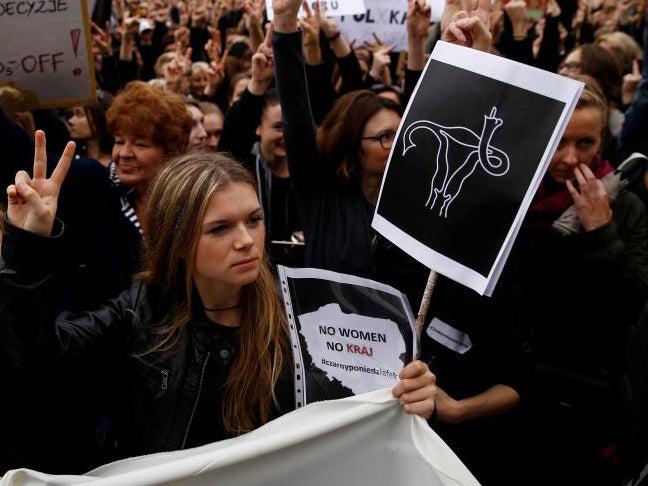Poland abortion strike: Why are women protesting?
Even an 11-year-old must give birth according to Law and Justice MEP

Your support helps us to tell the story
From reproductive rights to climate change to Big Tech, The Independent is on the ground when the story is developing. Whether it's investigating the financials of Elon Musk's pro-Trump PAC or producing our latest documentary, 'The A Word', which shines a light on the American women fighting for reproductive rights, we know how important it is to parse out the facts from the messaging.
At such a critical moment in US history, we need reporters on the ground. Your donation allows us to keep sending journalists to speak to both sides of the story.
The Independent is trusted by Americans across the entire political spectrum. And unlike many other quality news outlets, we choose not to lock Americans out of our reporting and analysis with paywalls. We believe quality journalism should be available to everyone, paid for by those who can afford it.
Your support makes all the difference.A sea of women dressed in black flooded the streets of Poland's cities for “Black Monday”: the latest in a series of demonstrations against the the government’s plans to introduce a ban on abortions.
They held signs bearing messages such as “Keep your rosaries off my ovaries” and “I wish I could abort my government” as they chanted outside government offices.
Public buildings closed down for official strikes in 60 cities across the country. The largest street rally was in downtown Warsaw, where 30,000 turned out, according to city hall.
Meanwhile, those in favour of the bill, which was formed after a petition with 450,000 signatures was handed to parliament, dressed in white in objection to the strike.
What is the law now?
Poland has restrictive laws in place already. Under the Communist regime, abortions were legal. But after the collapse of Communism, the Catholic Church regained influence in the country and banned in the practice in 1993 – with the exception of rape, incest, disability of the foetus and a risk to the health of the mother.
Yet even in cases where it is allowed, hospitals invoke “conscience clauses” to turn away women when a practitioner disagrees with carrying out a termination for religious or moral reasons.
The cost of abortions also stops people from getting a termination. The price of an operation is as high as the average polish salary, at about €600–700.
Under the existing law, women cannot be punished. Doctors who carry out the terminations can be prosecuted, but this rarely happens. There have been around fifteen cases against doctors in the 23 years since the law has been in place.
What would the new law change?
The country's right-wing Law and Justice Party (PiS) is demanding what is effectively a blanket ban on terminations. It also wants to criminalise women who have abortions and punish them with anything up to five years in prison.
This means that rape victims would not be able to have abortions. Arkadiusz Czartoryski, an MP for PiS, said that during the Second World War, women were raped on a massive scale and “gave birth to many good Poles. Why should that be changed now?”
Children who were raped would also be forbidden from having abortions under the new law. In one of his most controversial statements, PiS MEP Czesław Hoc once said that even an 11-year-old girl should have a child if she is pregnant because "there will always be many people who will want to care for the child."
The bill would also increase the maximum sentence for doctors carrying out the abortions to five years.
Activists are concerned the new law will cast suspicion on those who suffer miscarriages and will discourage doctors from carrying out routing procedures on pregnant women.
Join our commenting forum
Join thought-provoking conversations, follow other Independent readers and see their replies
Comments